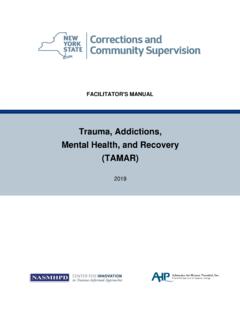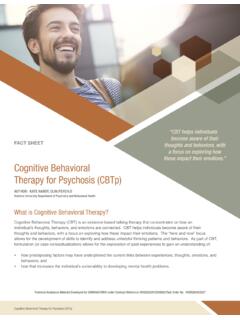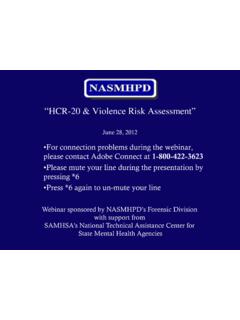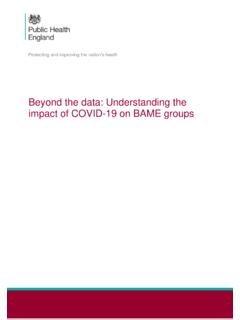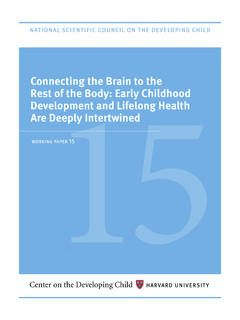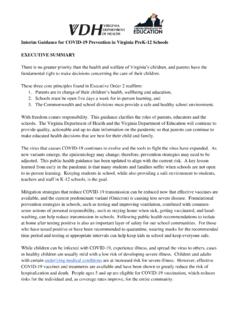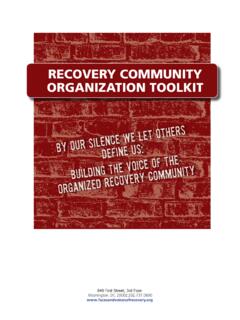Transcription of WHAT EVERY JUDGE NEEDS TO KNOW ABOUT TRAUMA
1 DRAFT. DRAFTfor for review and comment review and comment Essential Components of TRAUMA -informed Judicial Practice WHAT EVERY JUDGE NEEDS TO KNOW ABOUT TRAUMA . As a JUDGE with a treatment or problem-solving court, you probably know that many people who appear before you have experienced violence or other traumatic events. In fact, the experience of TRAUMA among people with substance abuse and mental health disorders, especially those involved with the justice system, is so high as to be considered an almost universal experience. What you may not know is that these TRAUMA experiences affect the person's physical health, mental health, and ability to respond successfully to treatment and other interventions. The stress of the courtroom environment may also affect the ability of TRAUMA survivors to communicate effectively with you and court personnel. Many judges have come to recognize that acknowledging and understanding the impact of TRAUMA on court participants may lead to more successful interactions and outcomes.
2 Recognizing the impact of past TRAUMA on treatment court participants does not mean that you must be both JUDGE and treatment provider. Rather, TRAUMA awareness is an opportunity to make small adjustments that improve judicial outcomes while minimizing avoidable challenges and conflict during and after hearings. This issue brief provides information, specific strategies, and resources that many treatment court judges have found beneficial. Behavioral Health Is Essential to Health Prevention Works Treatment is Effective People Recover DRAFT for review and comment CONTENTS. Defining TRAUMA , TRAUMA -Specific Services, and TRAUMA -Informed Impact of TRAUMA ..1. Behavior as Essential Components of TRAUMA -Informed Judicial What You Say: Communication What You Do: Court Processes and How You Do It: The Courtroom Resources for More ACKNOWLEDGMENTS. This report was prepared for the Substance Abuse and mental Health Services Administration (SAMHSA), by the National Association of State mental Health Program Directors (NASMHPD), contract number HHSS2832007000201 with SAMHSA, Department of Health and Human Services (HHS).
3 The authors are Susan Wells and Jenifer Urff. Joan Gillece served as the Project Director and Mary Blake served as the Government Project Officer. The report is a product of an April, 2011 meeting of treatment court judges and TRAUMA survivors convened by SAMHSA's National Center on TRAUMA -Informed Care and SAMHSA's National GAINS Center for Behavioral Health and Justice. DISCLAIMER. The views, opinions, and content of this publication are those of the authors and do not necessarily reflect the views, opinions, or policies of SAMHSA or HHS. PUBLIC DOMAIN NOTICE. All material appearing in this report is in the public domain and may be reproduced or copied without permission from SAMHSA. Citation of the source is appreciated. However, this publication may not be reproduced or distributed for a fee without the specific, written authorization of the Office of Communications, SAMHSA, HHS. ELECTRONIC ACCESS AND PRINTED COPIES.
4 This publication may be downloaded or ordered at Or call SAMHSA at 1-877-SAMHSA-7 (1-877-726-4727) (English and Espa ol). RECOMMENDED CITATION. Substance Abuse and mental Health Services Administration, SAMHSA's National Center on TRAUMA -Informed Care and SAMHSA's National GAINS Center for Behavioral Health and Justice: Essential Components of TRAUMA - Informed Judicial Practice. Rockville, MD: Substance Abuse and mental Health Services Administration, 2013. ORIGINATING OFFICE. Community Support Programs Branch, Division of Service and Systems Improvement Center for mental Health Services, Substance Abuse and mental Health Services Administration 1 Choke Cherry Road, Rockville, MD 20857. DRAFT for review and comment DEFINING TRAUMA , TRAUMA -SPECIFIC SERVICES, AND. TRAUMA -INFORMED APPROACHES. During EVERY incarceration, EVERY institutionalization, EVERY court-ordered drug treatment program, it was always the same: I was always treated like a hopeless case.
5 All people could see was the way I looked or the way I smelled. It wasn't until I finally entered a recovery- oriented, TRAUMA -informed treatment program, where I felt safe and respected, that I could begin to heal Someone finally asked me What happened to you? instead of What's wrong with you? Tonier Cain, Team Leader, SAMHSA's National Center for TRAUMA -Informed Care In a medical context, the term TRAUMA is often Several evidence-based services and used to refer to a serious bodily injury. In the interventions exist to effectively treat TRAUMA . context of people who have experienced These are called TRAUMA -specific services violence or other adverse events, TRAUMA is and interventions, and they are designed the psychological response to these events to help individuals understand how their past when they 1) are experienced as physically experiences shape their behavior and responses or emotionally harmful or threatening and to current events.
6 TRAUMA -specific services often 2) have lasting adverse effects on the individual's help individuals develop more effective coping functioning and physical, social, emotional, or strategies to address the impact of TRAUMA . spiritual well-being. A TRAUMA -informed approach to services or TRAUMA may be caused by exposure to violence, intervention acknowledges the prevalence and physical and sexual abuse, neglect, natural impact of TRAUMA and attempts to create a disasters and accidents, and any other events sense of safety for all participants, whether or not that induce powerlessness, fear, recurrent they have a TRAUMA -related diagnosis. Becoming hopelessness, and a constant state of alert. TRAUMA -informed requires re-examining policies TRAUMA may also be caused by discrimination and procedures that may result in participants due to gender, race, poverty, and sexual feeling loss of control in specific situations, training orientation.
7 The most traumatic experiences often staff to be welcoming and non-judgmental, and include betrayal by a trusted person or institution. modifying physical environments. The goal is to fully engage participants by minimizing perceived Unfortunately, people who have experienced threats, avoiding re-traumatization, and supporting TRAUMA may cycle in and out of the mental health, recovery. There is often little or no cost involved in substance abuse, and criminal justice systems. implementing TRAUMA -informed principles, policies, If their TRAUMA is not addressed, they may be and practices. considered treatment resistant or difficult . clients. In the criminal justice system, they More information ABOUT well-established TRAUMA - may be disruptive, require additional time and specific interventions is available online at resources in the courtroom, and be at risk of re-offending. IMPACT OF TRAUMA . Someone who's been beaten as a child expects that they're going to be beaten.
8 I saw the provocation all the time, with young men in particular. They provoke the court officers so at least they're controlling when it happens. Treatment Court JUDGE The Adverse Childhood Experiences (ACE) study, and Prevention and Kaiser Permanente, is conducted by the Centers for Disease Control one of the largest investigations ever conducted Page 1. DRAFT for review and comment to assess associations between childhood At a more immediate level, traumatic events . maltreatment and later-life health and regardless of the age of the person experiencing It documents strong and significant relationships them can shatter an individual's sense of safety between adverse childhood experiences and and trust. This may lead to general fearfulness adult health and behavioral health problems, and isolation that makes connecting to family, social and economic costs, and early mortality. friends, and treatment professionals difficult.
9 Untreated TRAUMA may result in a range of Many people who have experienced TRAUMA problematic behaviors including substance feel a sense of powerlessness or helplessness abuse, interpersonal violence, and gambling over their own lives, which may make it difficult that can lead to arrest, incarceration, and to engage in treatment programs and in judicial recidivism. proceedings. The ACE study involved 17,000 Kaiser A 5-year, 14-site study on women and violence, Permanente health plan members, the majority sponsored by the Substance Abuse and mental of whom were white, over age 50, and had Health Services Administration (SAMHSA), found some college education. Study participants were that services may be more effective if they: asked whether they had experienced potentially Are gender-specific traumatic events2 during their first 18 years of life. Include TRAUMA survivors in planning and The results indicate that childhood experiences delivery services of abuse and neglect are common and Integrate TRAUMA -specific treatment, mental destructive, even half a century after they health, and substance abuse services, occur.
10 ACE scores are significantly correlated rather than treat these problems separately with depression, substance abuse, attempted suicide, hallucinations, the use of antipsychotic Use group environments to help restore medications, multiple sex partners, and increased trust and promote healing from TRAUMA likelihood of becoming a victim of sexual assault It is important to be aware that many people or domestic violence. High ACE scores are also who appear before you remain in harmful significantly related to liver disease, chronic environments and relationships, even while pulmonary obstructive disease, heart disease, they participate in treatment court programs. autoimmune disease, and lung cancer. In addition, many TRAUMA survivors are re- Researchers hypothesize that adverse traumatized in the behavioral health and criminal experiences in childhood affect the health justice systems. Re-traumatization refers to the and behavior of adults through two primary psychological and physiological experience of mechanisms.
